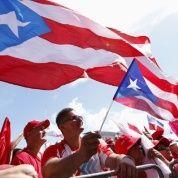Puerto Rico’s legal status is both confusing and contested. According to the United States, the Caribbean island is an unincorporated U.S. territory, while its official name labels it the Commonwealth of Puerto Rico.

But regardless of the legal designations, what is clear is that Puerto Rico’s relationship to the U.S. looks more like colonialism than anything else. And it's no secret — even U.S. Democratic presidential hopeful Bernie Sanders said the country treats Puerto Rico like a colony.
Here are five ways that the relationship between the U.S. and Puerto Rico is colonial.
1. Puerto Ricans Are U.S. Citizens, but Without the Rights
A little-known fact about Puerto Rico is that its residents are indeed U.S. citizens; a recent poll found most U.S. citizens don't even know this. But Puerto Ricans don’t actually enjoy all the rights accorded to citizens unless they move to the U.S. mainland. The U.S. granted citizenship to Puerto Ricans, also known as Boricuas, in 1917, nearly 20 years after taking control of the island. But the move was an act of Congress, meaning Puerto Ricans are not formally recognized as U.S. citizens through the Constitution—unless they relocate to a U.S. state.
2. Puerto Ricans Can’t Decide Who Decides Their Fate
Despite technically being U.S. citizens, Boricuas do not have the right to vote in U.S. elections as long as they live on the island. Residents of Puerto Rico go to the polls to vote in primaries, which are hosted by political parties, to nominate candidates, but don't actually have a say when it comes to electing the next president in the November general election. And while Puerto Rico has a representative in U.S. Congress, the member is a non-voting delegate, meaning they can talk about the island's issues but do little to address them.
3. Puerto Rico Denied Key Tools to Solve Debt Crisis
Puerto Rico’s legal status and colonial relationship with the U.S. has crippled its ability to tackle its debt crisis. Despite being a U.S. territory, the island is barred from declaring bankruptcy, an option only available to municipalities in U.S. states through the bankruptcy code. This legal conundrum has meant that it is very difficult for Puerto Rico to restructure its more than US$70 billion in debt.
4. U.S. Still Wants to Babysit Puerto Rico’s Imports

As an island economy, Puerto Rico depends on imports for food and other basic goods. But its control over imports is heavily restricted by a nearly century-old law that prohibits foreign ships from making a stop at Puerto Rico or any offshore U.S. territory before docking on the mainland. Rather, according to the 1920 Merchant Marine Act, also known as the Jones Act, goods destined for Puerto Rico must be received on the mainland and then shipped to the island by U.S. vessels.
The tedious requirement undermines Puerto Rico’s economic sovereignty and adds a complexity to the process of importation, in turn increasing the cost of imported goods compared to other Caribbean islands not stuck under the thumb of the United States. Reports by the World Economic Forum and Federal Reserve Bank of New York have found that the rule hurts the island’s potential for economic development.
5. U.S. Debt Crisis Plan Tightens Colonial Grip
After decades of maintaining a colonial relationship with Puerto Rico that limits the island’s autonomy, the U.S. is moving toward further backtracking on any glimpse of sovereignty with a proposed debt crisis plan known as the PROMESA Bill. The bill, the Puerto Rico Oversight, Management, and Economic Stability Act in full, proposes handing over debt restructuring to an independent oversight board appointed by U.S. President Barack Obama.
The bill, which also includes other provisions, is thought to have a good chance of passing in U.S. Congress — where Puerto Rico doesn’t have a vote. But critics argue that PROMESA is a pretext to undermine democracy in Puerto Rico and ramp up colonial rule on the island by giving U.S. authorities more power than Puerto Rico’s own government.